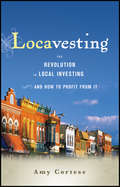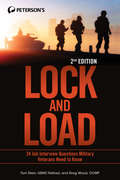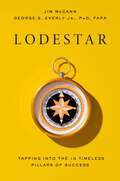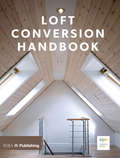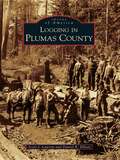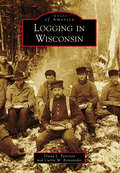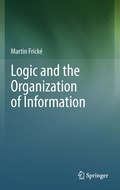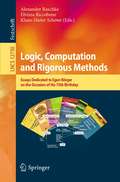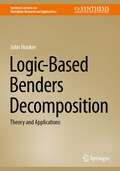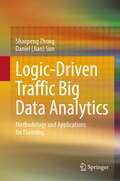- Table View
- List View
Locational Analysis of Firms’ Activities from a Strategic Perspective
by Toshiharu IshikawaThis book presents a variety of research papers on factories’ locations, city systems, and regional development. Consisting of three parts, it provides insights into the locational aspects of firms’ activities from a strategic perspective. Part 1 discusses decision-making in the context of location, specifying the motivation for firms to move their factories provided by the corporate tax system. It also presents a case study from East Asia to clarify a mechanism by which firms move factories. Part 2 addresses city systems, offering theoretical clues to understanding why city systems are important to regional economies. It also clarifies from the empirical analysis the relations between city systems and the performances of regional economies.Part 3 investigates the topic of industrial parks, demonstrating how they form a basis for establishing industrial clusters in regional economies. In addition, it examines the economic phases, such as economic disparity, generated in the process of development.
Locationmanagement für die Eventkonzeption (essentials)
by Kristina SommerDieses essential ist ein praxisorientierter Leitfaden für das Eventmanagement und hilft Ihnen bei der Auswahl der richtigen Location. Nicht nur bei Hochzeiten wird viel Zeit darauf verwendet, die passende Location zu finden. Der Raum ist bei jedem Event von zentraler Bedeutung, denn es grenzt diesen von seinem Umfeld ab und gibt die Gestaltung vor – sei es im Innenraum oder unter freiem Himmel. Erst mit der zielgerichteten Vorbereitung und dem richtigen Verständnis wird der Raum zum Teil der Eventinszenierung. Es ist daher erstaunlich, dass es in der deutschsprachigen Literatur zum Eventmanagement kaum umfassende Betrachtungen zur Location gibt. Das Buch schließt diese Lücke.
Locavesting
by Amy CorteseHow individuals and communities can profit from local investing In the wake of the financial crisis, investors are faced with a stark choice: entrust their hard-earned dollars to the Wall Street casino, or settle for anemic interest rates on savings, bonds, and CDs. Meanwhile, small businesses are being starved for the credit and capital they need to grow. There's got to be a better way. In Locavesting: The Revolution in Local Investing and How to Profit from It, Amy Cortese takes us inside the local investing movement, where solutions to some of the nation's most pressing problems are taking shape. The idea is that, by investing in local businesses, rather than faceless conglomerates, investors can earn profits while building healthy, self-reliant communities. Introduces you to the ideas and pioneers behind the local investing movement Profiles the people and communities who are putting their money to work in their own backyards and taking control of their destinies Explores innovative investment strategies, from community capital and crowdfunding to local stock exchanges With confidence in Wall Street and the government badly shaken, Americans are looking for alternatives. Local investing offers a way to rebuild our nest eggs, communities, and, just perhaps, our country.
Lochner v. New York: Economic Regulation on Trial
by Paul KensLochner v. New York (1905), which pitted a conservative activist judiciary against a reform-minded legislature, remains one of the most important and most frequently cited cases in Supreme Court history. In this concise and readable guide, Paul Kens shows us why the case remains such an important marker in the ideological battles between the free market and the regulatory state.
Lock and Load
by Tom Stein Greg WoodThings have changed, times have changed, and times are tough - especially if you're a military veteran seeking employment in today's economy. This essential guide is designed to help you succeed in your civilian job search. Written by a career military officer and a career expert, TheHireTactics introduces a methodology that includes innovative tools that go far beyond the traditional resume and cover letter. You will learn how to define your value in civilian terms and employ the strategies and tactics necessary to differentiate yourself from the competition and successfully complete your job search mission.Learn the 4 Milestones for Civilian Employment: Packaging - teaches you how to implement new and unique tools that will clearly separate you from your competition. Promotion - introduces strategies and techniques that help you successfully penetrate the hidden job market by broadcasting your value to the business community, not your resume. Product Demonstration - teaches you the techniques to conduct a proactive, strategic interview that will greatly enhance your chances of getting the offer. Pricing - Teaches you how to negotiate the difference between what you're offered and your true worth to the organization.
Lockdown America
by Christian ParentiLockdown America documents the horrors and absurdities of militarized policing, prisons, a fortified border, and war on drugs. Its accessible and vivid prose makes clear the links between crime and politics in a period of gathering economic crisis.
Lockdown: Social Harm in the Covid-19 Era
by Daniel Briggs Justin Kotzé Anthony Lloyd Anthony Ellis Luke TelfordThis book asks whether the decision to lock down the world was justified in proportion to the potential harms and risks generated by the Covid-19 virus. Drawing on global, empirical data, it explores and exposes the social harms induced by lockdowns, many of which are 'hidden', including joblessness, mental health problems and an intensification of societal inequalities and divisions. It offers data-driven case studies on harms such as domestic violence, child abuse, the distress of being ordered to stay at home, and the numerous harms associated with the new wealth industries. It explores why some people weren't compliant with lockdown restrictions and examines the already vulnerable social groups who were disproportionally affected by lockdown including those who were locked in (care home residents), locked up (prisoners), and locked out (migrant workers, refugees). The book closes with a brief discussion on what the future might look like as we enter a post-Covid world, drawing on cutting-edge social theory.
Lockheed Martin: The Employer of Choice Mission
by Clayton M. Christensen Michael OverdorfA Lockheed Martin manager is faced with the decision of where to focus the organization's resources in order to develop a world-class employee development system. The manager's recommendation will serve as the basis for the company's goal of becoming an Employer of Choice in the minds of its current and prospective employees. Compounding the difficulty of his decision is the pressure from the current financial, operational, and cultural challenges facing the business. With the defense industry becoming more cost competitive and contracts being awarded to non-traditional defense industry suppliers, Lockheed Martin is faced with a need to reduce its cost structure while developing employee talent and future leaders who can adapt quickly to change and effectively lead in this new environment.
Lockout-Tagout: Verriegelung Von Stellgliedern Zur Umfassenden Wartungssicherung Von Maschinen (essentials)
by Lars Schnieder Tim-Colin UhdeDas Inverkehrbringen und der Betrieb von Maschinen erfordern, das Einhalten von (Sicherheits-)Anforderungen zu dokumentieren, in Gefährdungsbeurteilungen das Risiko zu ermitteln, Schutzmaßnahmen abzuleiten und umzusetzen. Trotz des einheitlichen Rechtsrahmens kommt es gerade bei Instandhaltungsarbeiten weiterhin zu schweren Arbeitsunfällen, z.B. durch unkontrolliert austretende Energien wegen deaktivierter Schutzmechanismen. Die Autoren führen in den Rechtsrahmen der Maschinen- und Betriebssicherheit ein und leiten daraus die wichtige Absicherung unkontrollierter Energiequellen während der Instandhaltung ab. Mit Lockout-Tagout stellen sie ein anerkanntes Verfahren zur Verbesserung der Betriebssicherheit vor. Hierzu kombinieren die Autoren Verfahrensanweisungen, technische Maßnahmen und Schulungen mit einer kontinuierlichen Überwachung der Wirksamkeit der Maßnahmen.Die AutorenDr.-Ing. Lars Schnieder verantwortet in einer Software-Entwicklungsfirma das Geschäftsfeld Sicherheitsbegutachtung. Er ist international als Sachverständiger für die Maschinen- und Betriebssicherheit tätig.Tim-Colin Uhde ist in dieser Firma als Sachverständiger für die Maschinen- und Betriebssicherheit tätig.
Lockout-Tagout: Verriegelung von Stellgliedern zur umfassenden Wartungssicherung von Maschinen (essentials)
by Lars Schnieder Tim-Colin UhdeDas Inverkehrbringen und der Betrieb von Maschinen erfordern, das Einhalten von (Sicherheits-)Anforderungen zu dokumentieren, in Gefährdungsbeurteilungen das Risiko zu ermitteln, Schutzmaßnahmen abzuleiten und umzusetzen. Trotz des einheitlichen Rechtsrahmens kommt es gerade bei Instandhaltungsarbeiten weiterhin zu schweren Arbeitsunfällen, z.B. durch unkontrolliert austretende Energien wegen deaktivierter Schutzmechanismen. Die Autoren führen in den Rechtsrahmen der Maschinen- und Betriebssicherheit ein und leiten daraus die wichtige Absicherung unkontrollierter Energiequellen während der Instandhaltung ab. Mit Lockout-Tagout stellen sie ein anerkanntes Verfahren zur Verbesserung der Betriebssicherheit vor. In der 2. Auflage dieses Buches wurde die systematische Vorgehensweise zur Umsetzung eines Programms zur Gefährdungsbeherrschung von Betreibern von Maschinen grundlegend erweitert und ergänzt. Hierzu kombinieren die Autoren Verfahrensanweisungen, technische Maßnahmen und Schulungen mit einer kontinuierlichen Überwachung der Wirksamkeit der Maßnahmen.
Loctite Corp.: Industrial Products Group
by John A. QuelchA new product introduction strategy covering all elements of the marketing mix must be planned for equipment designed to dispense industrial adhesives. The equipment and adhesives are manufactured by the same company.
Loctite Corp.: International Distribution
by John A. Quelch David J. ArnoldLoctite Corp., dissatisfied with the sales growth achieved by its independent distributor in Hong Kong, is considering whether to find a new distributor or acquire a controlling interest in a wholly owned subsidiary covering Hong Kong and possibly other markets. Loctite has a varied portfolio of international distribution arrangements and experience on which to base this decision.
Lodestar: Tapping Into the 10 Timeless Pillars of Success
by Jim McCann George S. EverlyLike the North Star, pointing you in the right direction, Lodestar by Jim McCann and George S. Everly, Jr. PhD, FAPA is your essential guide to learning the key components of success and applying them to your life. A ONE-STOP SHOP FOR THE BEST OF SELF-HELP The innate drive to &“do better&” and to &“be better&” seems to be hard-wired in most individuals. In fact, the $10 billion self-help industry would seem a compelling testament to that conclusion. It has produced libraries of priceless insight from gurus and everyday folks, celebrities and prodigies, millionaires and poets. There&’s plenty of advice out there to get you almost anywhere you want to go—and more than enough to get lost in. So, where do you begin? That&’s where Jim McCann and George S. Everly, Jr., PhD, FAPA come in. Together, the 1-800-FLOWERS.com founder and the esteemed psychologist have combined the practical with the scientific to explore the most celebrated self-help books and unveil the top reoccurring themes: why they matter, and how they are applied, in one digestible volume. No book like this has ever been written! The core tenets of building a better life for yourself are covered here through the best thinking of the last hundred years of self-improvement, plus exclusive interviews with people whose success stories bring it all to life. The endless quest for growth is universal to human nature. You can overcome hardship to thrive and flourish if only you find the right way forward. Lodestar is your shortcut to that elusive path.
Loewen Group, Inc.
by Stuart C. Gilson Jose CamachoA publicly traded funeral home and cemetery consolidator faces imminent financial distress. The company has aggressively grown through use of debt. Restructuring the debt is potentially very costly to creditors, shareholders, suppliers, and other corporate stakeholders. Cross-border and accounting issues potentially complicate the restructuring.
Loewen Group, Inc. (Abridged)
by Stuart C. GilsonA publicly traded funeral home and cemetery consolidator faces imminent financial distress. The company has grown aggressively through the use of debt. Restructuring the debt is potentially very costly to creditors, shareholders, suppliers, and other corporate stakeholders. Cross-border and accounting issues could complicate the restructuring.
Loft Conversion Handbook
by Construction Products AssociationThis book is an easy-to-use handbook, providing architects and builders with up-to-date guidance on managing loft conversions and ensuring they achieve compliance with the Building Regulations. It brings together solutions offered in the Approved Documents and third tier guidance, such as industry literature, in one concise and fully illustrated guide. Starting with chapters on the existing structure, the guide is then divided into chapters on the main considerations for a loft conversion, covering topics such as fire safety, windows and doors, and insulation. This is an essential read for anyone looking for a guide which simplifies the building regulations process and offers solutions, where applicable, to achieve minimum, good practice and advanced construction standards.
Logging in Plumas County
by Scott J. Lawson Daniel R. ElliottLocated within the northern Sierra Nevada mountain range, the forests of Plumas County were once seen as a source of endless timber. Lumber was needed during the Gold Rush for water flumes, mine timbers, and an array of buildings. While timber was abundant, the abilities of the early settlers to harvest, transport, and mill the logs were often very limited. Markets remained relatively local throughout the second half of the 19th century until the completion of the Western Pacific Railroad in 1909. This sparked a new rush of industry into the region. Vast tracts of untapped Plumas County timber were bought up by speculators, and many sawmills were erected. Logging in the western United States moved from animal power to steam engines to internal combustion in the space of about 50 years. While Plumas County's lumber industry was reflective of these developments, it also found its own identity as a timber-producing region that was nearly unequaled.
Logging in Wisconsin (Images of America)
by Carrie M. Ronnander Diana L. PetersonWisconsin was the perfect setting for the lumber industry: acres of white pine forests (acquired through treaties with American Indians) and rivers to transport logs to sawmills. From 1840 to 1910, logging literally reshaped the landscape of Wisconsin, providing employment to thousands of workers. The lumber industry attracted businessmen, mills, hotels, and eventually the railroad. This led to the development of many Wisconsin cities, including Eau Claire, Oshkosh, Stevens Point, and Wausau. Rep. Ben Eastman told Congress in 1852 that the Wisconsin forests had enough lumber to supply the United States “for all time to come.” Sadly, this was a grossly overestimated belief, and by 1910, the Wisconsin forests had been decimated. Logging in Wisconsin explores the 70 years when logging ruled the state, covering the characters who worked in forests and on rivers, the tools they used, and the places where they lived and worked.
Logic and Society: The Political Thought of John Stuart Mill, 1827-1848
by Yuichiro KawanaThis book discusses John Stuart Mill’s intellectual activity from about 1827 to 1848, namely between his recovery from his so-called ‘Mental Crisis’ and the publication of Principles of Political Economy. During this period, along with deepening his understanding of contemporary society as commercial civilization, Mill aspired to create a new system of science of society which would inquire into the nature, process of historical change, and prospects of society. Among the indispensable constituent sciences of his system, this book pays particular attention on his projected sciences of history and of the formation of character (ethology), and clarifies that the implications of his interest in these sciences were more significant for the better understanding of Mill’s political thought than many scholars have assumed.
Logic and the Organization of Information
by Martin FrickéLogic and the Organization of Information closely examines the historical and contemporary methodologies used to catalogue information objects--books, ebooks, journals, articles, web pages, images, emails, podcasts and more--in the digital era. This book provides an in-depth technical background for digital librarianship, and covers a broad range of theoretical and practical topics including: classification theory, topic annotation, automatic clustering, generalized synonymy and concept indexing, distributed libraries, semantic web ontologies and Simple Knowledge Organization System (SKOS). It also analyzes the challenges facing today's information architects, and outlines a series of techniques for overcoming them. Logic and the Organization of Information is intended for practitioners and professionals working at a design level as a reference book for digital librarianship. Advanced-level students, researchers and academics studying information science, library science, digital libraries and computer science will also find this book invaluable.
Logic of Product-Line Extensions
by EditorsIn the last ten years, products have proliferated in every category of consumer goods and services, and the deluge shows few signs of letting up. Most companies are pursuing product expansion strategies--in particular, line extensions--full steam ahead. But as John Quelch and David Kenny argue in "Extend Profits, Not Product Lines" (September-October 1994), evidence indicates that such aggressive tactics can be hazardous. Quelch and Kenny offer several guidelines for avoiding the pitfalls of wanton line extensions and sharpening product line strategies: improve cost accounting, allocate resources to popular products, research consumer behavior, coordinate marketing efforts, work with channel partners, and foster a climate in which product-line deletions are encouraged. In this issue's Perspectives section, nine experts offer their views on product-line management and the logic of line extensions.
Logic, Computation and Rigorous Methods: Essays Dedicated to Egon Börger on the Occasion of His 75th Birthday (Lecture Notes in Computer Science #12750)
by Klaus-Dieter Schewe Alexander Raschke Elvinia RiccobeneThis Festschrift was published in honor of Egon Börger on the occasion of his 75th birthday.It acknowledges Prof. Börger's inspiration as a scientist, author, mentor, and community organizer. Dedicated to a pioneer in the fields of logic and computer science, Egon Börger's research interests are unusual in scope, from programming languages to hardware architectures, software architectures, control systems, workflow and interaction patterns, business processes, web applications, and concurrent systems.The 18 invited contributions in this volume are by leading researchers in the areas of software engineering, programming languages, business information systems, and computer science logic.
Logic-Based Benders Decomposition: Theory and Applications (Synthesis Lectures on Operations Research and Applications)
by John HookerThis book is the first comprehensive guide to logic-based Benders decomposition (LBBD), a general and versatile method for breaking large, complex optimization problems into components that are small enough for practical solution. The author introduces logic-based Benders decomposition for optimization, which substantially generalizes the classical Benders method. It can reduce solution times by orders of magnitude and allows decomposition to be applied to a much wider variety of optimization problems. On the theoretical side, this book provides a full account of inference duality concepts that underlie LBBD, as well as a description of how LBBD can be combined with stochastic and robust optimization, heuristic methods, and decision diagrams. It also clarifies the connection between LBBD and combinatorial Benders cuts for mixed integer programming. On the practical side, it explains how LBBD has been applied to a rapidly growing variety of problem domains. After describing basic theory, this book provides a comprehensive review of the rapidly growing literature that describes these applications, in each case explaining how LBBD is adapted to the problem at hand. In doing so this work provides a sourcebook of ideas for applying LBBD to new problems as they arise.
Logic-Driven Traffic Big Data Analytics: Methodology and Applications for Planning
by Shaopeng Zhong Daniel (Jian) SunThis book starts from the relationship between urban built environment and travel behavior and focuses on analyzing the origin of traffic phenomena behind the data through multi-source traffic big data, which makes the book unique and different from the previous data-driven traffic big data analysis literature. This book focuses on understanding, estimating, predicting, and optimizing mobility patterns. Readers can find multi-source traffic big data processing methods, related statistical analysis models, and practical case applications from this book. This book bridges the gap between traffic big data, statistical analysis models, and mobility pattern analysis with a systematic investigation of traffic big data’s impact on mobility patterns and urban planning.


